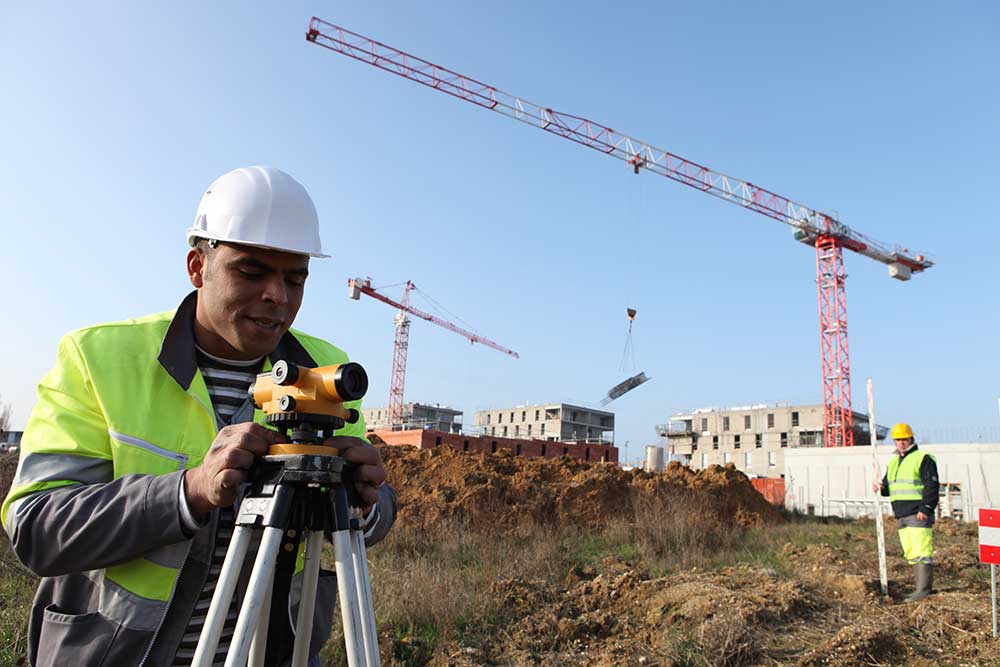Disclaimer: The information on our website is provided for general information purposes only. We make no representations or warranties of any kind, express or implied, about the completeness, accuracy, reliability, suitability or availability with respect to the website or the information contained on our website for any purpose. Any reliance on such information is therefore strictly at your own risk and we are not liable for any damages or losses arising out of or resulting from your reliance on any information contained on our website.
A surveyor determines property boundaries by taking precise measurements. They provide data for engineering industries, construction projects, and map making that is relevant to their client or employer. A surveyor may prevent legal disputes by updating boundary lines and preparing sites for construction. Surveyors work both indoors and outdoors in fieldwork.
Watch a video to learn what a surveyor does:
How to Become a Surveyor
A surveyor must have a bachelor’s degree due to the necessity of working with sophisticated math and technology. It is often acceptable to hold a bachelor’s degree in forestry, civil engineering, or a closely related field.
Most states require a surveyor graduate from a program that is accredited by ABET and gain a minimum of 4 years experience under a licensed surveyor. However, some states may accept an aspirant with an associate’s degree in surveying along with work experience under a licensed surveyor. Continuing education is usually required in most states as well. The National Council of Examiners for Engineering and Surveying has a 4 step generalized process which are:
- Complete the level of education required in your state
- Pass the exam of Fundamentals of Surveying (FS)
- Gain work experience under a licensed surveyor
- Pass the exam for Principles and Practice of Surveying (PS)
Job Description of a Surveyor
The duties of a surveyor would include the measuring of angles and distances between points below, on, and above the Earth’s surface. They also research survey and land records as well as land titles. He or she would travel to relevant sites and determine exact locations of important features by using known reference points. Surveyors gather proof of previous boundaries in order to compare where boundary lines are located and record the results to ensure data accuracy. A surveyor prepares reports, maps, and plots and presents their findings to government agencies and clients.
They determine exact locations of buildings or roads and the correct depth for building foundations. He or she may also indicate possible restrictions on property or a structure. Surveyors may also testify in court regarding survey work completed and establish official water and land boundaries for leases, deeds, or other legal documents. A surveyor should be skilled in problem solving, time management, and be very detail-oriented. They should have good visualization and physical stamina as lots of time is spent on their feet.
Surveyor Career Video Transcript
Whether the project is measuring the depth needed for a skyscraper’s foundation or mapping backyard boundaries, a surveyor steps in to get the lay of the land. Surveyors use sophisticated technology to take precise measurements of the Earth’s surface for maps and construction projects. They prevent—or help to resolve— boundary disputes for both home and business owners by documenting legal property lines, and helping determine the exact locations of real estate and building projects.
During construction, surveyors determine the precise location of roads or buildings and proper depths for building foundations. They conduct research on land records and titles to show changes to a property line, and report on restrictions, such as the type and size of structures that may be built on a property. Most surveyors work for surveying or engineering companies; some work in construction or for government offices. Although surveyors spend time in offices, fieldwork is essential, and often involves standing for extended periods and walking long distances, sometimes hauling heavy equipment, in all kinds of weather. Most work full-time.
Surveyors typically need a bachelor’s degree in surveying, or a related field. A license is needed to certify legal documents and provide surveying services to the public. In addition to passing the licensure exams, surveyors generally need several years’ experience working under a licensed surveyor to obtain a license.
Article Citations
Bureau of Labor Statistics, U.S. Department of Labor, Occupational Outlook Handbook, Surveyors.
National Center for O*NET Development. 17-1022.00. O*NET OnLine.
The career video is in the public domain from the U. S. Department of Labor, Employment and Training Administration.

